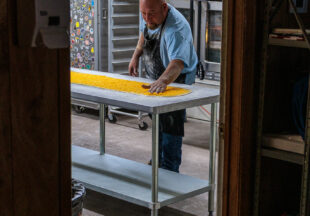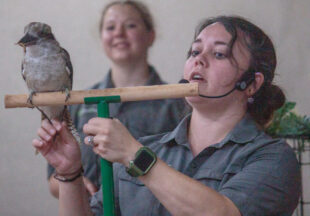Stephens County moves to Stage 3 as COVID-19 threat seems to lessen; hospital to offer 15-minute tests soon

On Friday afternoon, Stephens Memorial Hospital personnel hosted the weekly COVID-19 update for the county, announcing the first local death from the disease, as well as the plan to move the county from Stage 5 to Stage 3, thereby lessening restrictions on the community. Also announced on Friday was information about the antibody testing that the hospital now offers and the new 15-minute test that they plan to offer by the end of this week.
Christy Begeman, Chief Nursing Officer at SMH, said that she was on a conference call with the Texas Hospital Association last week and that the overall coronavirus situation around the state seems to be improving. “It sounds like, from what people are saying on that call that active cases are starting to kind of plateau in multiple areas,” she said. “So, we’ve hopefully hit that stage where we’re not creeping up still here in Texas.”
The update was broadcast live on KLXK 93.5 radio and on the Stephens County Facebook page.
Stage 3
About a month ago, Stephens County Judge Michael Roach announced a five-stage Community Health Plan, based on the local and regional COVID-19 situation. The county was immediately placed in Stage 3 but was moved to Stage 5 a couple of weeks later when regional hospitals began to see multiple patients, leaving Breckenridge no place to transfer potential patients.
In the past two weeks, the number of active cases in Stephens County has dropped to one, and other communities in the area are seeing fewer hospitalizations. That led Roach to move the county back to Stage 3, which includes requirements for local residents to practice social distancing and proper hand hygiene, limit unnecessary travel and stay at home if they’re sick, as well as a recommendation for everyone to wear a mask when out in public.
In addition to moving the county to Stage 3, Roach also filed the necessary paperwork with the governor’s office requesting an exemption for Stephens County from the requirements set forth in Gov. Greg Abbott’s executive order GA-29.
If the exemption is approved, county residents would no longer be required to wear masks in public. The governor’s order offered exemptions for counties with fewer than 20 active cases of COVID-19, but in order to qualify for the exemptions, the request had to be filed by the county judge.
On a Facebook post announcing that he was filing for the exemption, Roach offered the following explanation:
First, I did not sign the exemption early on because we were seeing a local increase in cases, and our regional hospital ICU capacity was limited. For a time, the capacity was critical. In my view, and according to our established local health plan, that constituted a public health emergency. Allow me to offer another example. There is not a perfect analogy for this pandemic, but let me give this a try. During flooding in our county, we closed significant U.S. highways (US Hwy 180 & 183). Citizens understood the danger and appreciated local government working within its constitutional authority for the safety of our community. Flooding is a clear and present danger, and we responded. With COVID-19, we felt there were markers that would be “flooded roads” during this pandemic. Not being able to transfer a critical patient, may(be) your loved one or you, was an unacceptable scenario. While we could not stop the virus, if we could slow the spread or “close the road,” it would be irresponsible for us not to act.
Second, consider the closed road scenario again. If we were to leave the barricades up after the flooding subsided, we would be unnecessarily closing roads without an imminent threat to public health. Not opting out of (the) mask order would be a similar situation. Regional ICU capacity has been increasing, and the flow of new patients is on the decline. While we still recommend wearing a mask in public places where you cannot physically distance, a mandate is not necessary. I realize the controversy around masks. I feel the government should educate and not mandate unless the “water is crossing the road.” Citizens, not the government, should make good personal health choices. All along, we have asked you to “love your neighbor as yourself.”
Finally, if the situation digresses and ICU capacity once again becomes limited, we will follow our public health plan. If Stephens County sees 20 or more active cases, the State of Texas will limit capacity in local businesses, and that would be devastating. Bars and restaurants could have their licenses suspended, and BISD could be impacted in a significant way during the school year. Let us continue to do the RIGHT THING and keep our local case count low so our economy and community can remain healthy.
Additionally, Roach reminded local citizens that businesses in the community may still have mask requirements for their customers and that shoppers would be expected to comply with company rules at any business they visit.
“Please, Stephens County, let us be charitable to the employees. If a store has a rule, they can refuse service to anyone. For those who are ‘at-risk,’ many safe options still exist for you to shop and conduct business in our community,” he wrote.
Local reported deaths
Last week, the Texas Department of State Health Services reported that two Stephens County residents had died from COVID-19. However, local officials knew nothing about the deaths.
Roach and hospital officials investigated the situation and discovered that neither patient had lived in Breckenridge recently. One of the deceased was a 92-year-old woman who had lived in a Fort Worth-area nursing home for two years, but her official identification still had a Breckenridge address on it. The other COVID-19 death reported by TDSHS was an 83-year-old woman who was living in a Graham nursing home. Her husband still lives in Breckenridge.
Neither patient contracted the disease in Breckenridge nor were they ever treated for it here.
During Friday’s update, Chris Curtis, Director of Business Development for SMH, also reported that the Breckenridge patient who had been hospitalized for several weeks passed away last week.
“I think it is important to make a differentiation between people that are passing away ‘with COVID’ versus ‘from COVID,’” he said. “In all three of these cases, they’ve had a multitude of underlying conditions that led to their passing.”
Delays in Reporting
Also during the update, Curtis explained some of the problems the hospital is experiencing in reporting the number of cases to the community.
He said part of the confusion is how much time it takes to get the information from the state, especially if the person was tested somewhere outside the county. For example, he received a report on Friday that a person from Stephens County was listed as testing positive, but the end of their isolation date was Thursday, July 30, the day before. So he put the test result directly onto the recovered list even though SMH had never shown them to be on the active list.
“There’s a lot of time being spent on ensuring that we are providing you guys with correct, factual numbers and not just hearsay from here and there and everywhere,” he said.
Another factor that may cause some confusion is that inmates at the Walker Sayle correctional facility are not reported by the State of Texas with the county’s numbers of COVID-19 cases. They are recorded separately; however, SMH and county officials do not have access to that information. Any Walker Sayle Unit guards or other employees who test positive and who live in Stephens County will be counted in the county totals.
According to a July 29 news release from the Texas Department of Criminal Justice, there have been 163,362 offenders and 51,342 employees tested for COVID-19. Of those tested, 15,285 offenders and 3,288 staff have tested positive for COVID-19 in both symptomatic and asymptomatic testing. There have been 11,241 offenders and 1,931 employees who have recovered. Statewide, there have been 107 offender deaths connected to COVID-19 with an additional 30 under investigation. There have been 14 employee line-of-duty deaths from COVID-19, throughout the prison system.
Local testing options
Steve Ezzell, the lab director at SMH, said that the hospital is now performing antibody tests for COVID-19. The blood test detects the antibodies that a person’s body produces when it has been exposed to the disease and is trying to fight it off.
Additionally, Curtis said later that SMH should begin offering a 15-minute COVID-19 test by the end of this week.
“We’re just waiting on it to show up. We have the equipment; we’re just literally waiting on the swabs,” he said.
The hospital will be able to use the same equipment they currently have in their lab to analyze the 15-minute COVID-19 samples, as they do to analyze samples for strep throat and the flu test.
Curtis said once they have the testing in place, somebody will be able to get tested and know in 15 minutes if they have COVID-19. Currently, the tests that are given at the hospital are sent off to an outside lab that often takes days or even weeks to get results back.
Although insurance companies typically pay for COVID-19 tests, not everyone has insurance. Curtis said that the regular nasal swab test costs $56.25 and the antibody test costs $56.54 for those who just want to pay cash for the test.
He said they don’t yet know what the price of the new 15-minute test will be.
In order to get a test, a patient will need to have a referral or order from a doctor and that often can be obtained over the phone, Curtis said.
Masks
“I want to talk a little bit about mask wearing,” Ezzell said. “…You know, wearing a mask isn’t so much about constitutional rights as it is about trying to get along with your fellow man, really. The benefits of wearing a mask are that a cloth mask can stop the virus if the cloth is woven small enough. But, even if the virus does get through the mask… what studies are showing is that it’s reducing the viral load. And, so people that get sick while they’re wearing a mask don’t get as sick as people that get sick without a mask.”
He went on to encourage everyone to wear a mask when out in public.
Story by Carla McKeown and Tony Pilkington/Breckenridge Texan
Cutline, top photo: Stephens Memorial Hospital officials, Chris Curtis, Christy Begeman and Steve Ezzell, hosted the local COVID-19 update on Friday, July 31. (Photo courtesy of Bo Asher)































































































